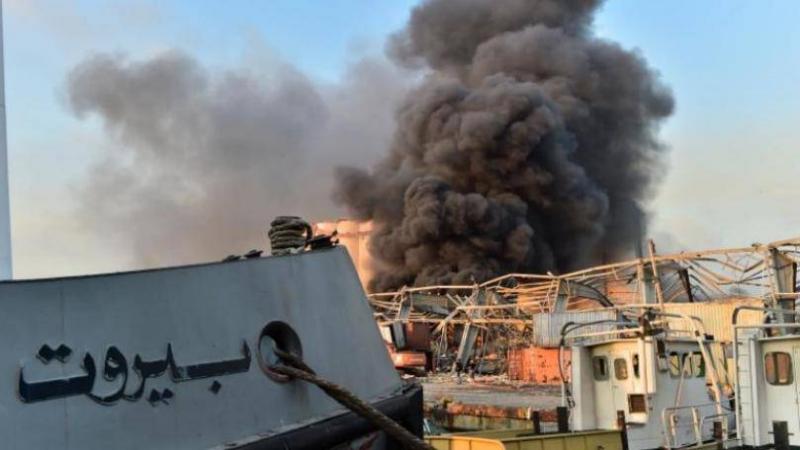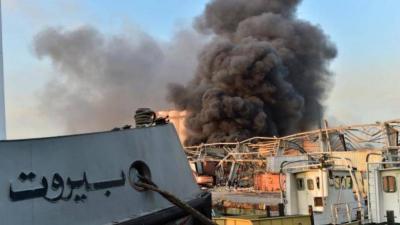The complexities surrounding the appointment of an additional investigator in the Beirut port explosion case are becoming apparent day by day, especially regarding the overlapping authorities between the original investigator, Tarek Bitar, and the expected new appointee whose name will be announced early next week. Contrary to clarifications from close associates of the Higher Judicial Council that the new investigator's powers will be limited to requests for release and humanitarian issues related to transferring detainees, a prominent judicial authority provided a different description of the new judge's role, revealing to "Asharq Al-Awsat" that the additional investigator “will possess the full powers of the original judge, including handling release requests and ruling on procedural defenses, as well as having the right to conduct hearings with witnesses and interrogate the accused.”
He acknowledged that “the decision, although taken by the highest judicial authority, was hasty and not sufficiently studied or scrutinized to mitigate its negative repercussions on the judiciary as a whole, not just on the port case.” Numerous examples indicate potential issues the investigators will face should they work together. The judicial authority, who requested anonymity, questioned, “If there is a conflict in decisions between the two judges, who will regulate this conflict or difference in their legal approaches? If the original judge's procedures contradict those of the second investigator, what will we do? And which judicial authority resolves the discrepancy between the two individuals?” He pointed out that “there are reports indicating the possibility of challenging the appointment decision before the Council of State, and we do not know whether the Council of State is a competent authority to annul such a decision or pursue it.”
The dissent within the judiciary has been growing, placing the Judicial Council in a precarious position. The "Judges Club" announced its outright rejection of the Council's decision, stating in a press release: “After confirming the news of the approval to appoint a second judicial investigator in the Beirut port explosion investigation, and regardless of the powers that will be granted to him, we say no, O men of law and those with extensive judicial expertise; this is not how rights are preserved, nor how justice is achieved, nor how confidence in the judiciary is restored to uphold its dignity. This is not how negotiations and discussions should proceed to obtain a law that institutionalizes the independence of the judiciary.”
The Judges Club, which includes over half of Lebanon's judges, argued that “whatever the reasons that prompted the authority to propose and approve such a measure, it would have been more sensible to appoint a replacement for Minister of Finance Youssef Khalil to expedite the release of the draft decree for judicial formations to allow the investigation to resume its legal course, instead of resorting to a solution that all legal and judicial professionals agree is illegal; there is no substitute when the original exists.” They urged the Judicial Council to “seek the real obstructionist, confront him as an authority, and fight him with all existing efforts; find appropriate legal solutions based on established precedents, but do not appease him or give him what he desires; do not participate in destroying what remains of the judiciary's authority, nor engage with those proposing arbitrary solutions. Rather, reconsider your decision, for retracting a mistake is a virtue.”
On the basis that all warnings raised against the decision will change nothing in reality, factions close to the Judicial Council defended the “correctness of the decision,” claiming it was “an emergency decision made to address an urgent and fundamental humanitarian issue, which is the rulings on the release requests of 19 detainees in the case, or their transfer considering their humanitarian conditions in detention facilities.” They asserted to “Asharq Al-Awsat” that “the Judicial Council made its decision free of political pressure or external interventions, evidenced by the fact that it was issued unanimously by council members.” The questioned, “Is it reasonable for all council members to have succumbed to the influence of political interference? Is there not a single judge among the members who is free from pressure?”
Regarding the reasons that prevented the Judicial Council from appointing members of the General Assembly of the Court of Cassation, which would enable the assembly to rule on the cases restricting Bitar, instead of proceeding with a decision that sparked division within the judiciary, sources close to the Council stated: “The main obstruction to the investigations of Judge Bitar are the appeals filed against him, not the outstanding cases before the General Assembly of the Court of Cassation.” They reiterated the previous precedent of appointing a supplementary judicial investigator, Judge Jihad Al-Wadi, in the case of the assassination of former Prime Minister Rafik Hariri when the original judge, Elias Eid, was abroad.
The mention of this specific precedent drew ire from Judge Jihad Al-Wadi, who has been retired, prompting him to issue a definitive statement refuting his appointment as a supplemental investigator in the Hariri assassination case. Judge Al-Wadi stated in a statement shared with “Asharq Al-Awsat”: “I would have hoped that the Judicial Council would have consulted me before publishing the decision regarding me personally and considering it a judicial precedent, to confirm its implementation at that time. The reality, as far as I'm concerned, is that I never received any notification of the mentioned decision, nor did I ever hold the position of supplemental judge, and I only learned of this decision today through the media.”
Moreover, Judge Al-Wadi, who is now retired, added: “In any case, had this assignment been offered to me, I would not have accepted it, especially since I was serving as the president of the first Court of Appeal in Beirut, and I should not accept a position as a supplemental judge,” urging anyone claiming this precedent to “produce the document proving my receipt of this decision, bearing my signature.”
Meanwhile, families of the victims of the Beirut port explosion continue their field movement in protest of Justice Minister Henry Khoury's proposal, which received the approval of the Higher Judicial Council. Some of them stormed the Ministry of Justice building, managing to access several floors, and video clips circulated on social media showed some families trapped on the stairs after iron doors were closed, while security forces attempted to prevent them from reaching the fifth floor, where Justice Minister Henry Khoury and the ministry's general director are situated. One of the victims' family members commented, “What is happening inside is an assault on the families of the victims and on journalists, confirming that the state is police-like. We have stated that we are peaceful, and what the Justice Minister did is outside the law.”




